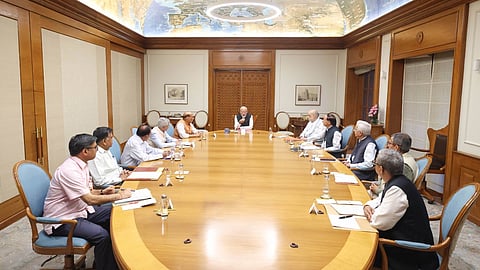

NEW DELHI: In a high-stakes response to one of the deadliest terror attacks in Jammu and Kashmir in recent years, India’s top security brass convened an emergency meeting on Wednesday, signaling a hardening diplomatic and strategic posture against Pakistan.
With the resolve of ‘Desh nahi Jhukane denge’ (We will not let the nation bow down), the Cabinet Committee on Security (CCS), chaired by Prime Minister Narendra Modi, on Wednesday held a more than two-and-a-half-hour-long meeting to deliberate on India's response to the Pahalgam terror attack that killed 26 tourists on Tuesday.
The CCS, which included Defence Minister Rajnath Singh, Home Minister Amit Shah, and National Security Adviser Ajit Doval, began with a briefing from Foreign Secretary Vikram Misri.
Home Minister Amit Shah then presented ground realities to the Prime Minister. The discussion spanned diplomatic and military options, though the initial response remains firmly diplomatic.
The committee decided on a set of sweeping diplomatic and strategic measures aimed at isolating Pakistan. India will terminate the Indus Waters Treaty with Pakistan, suspend the issuance of SAARC visas to Pakistani nationals, and recall its diplomats from Islamabad. The Integrated Check Post at Attari will also be shut immediately.
Foreign Secretary Vikram Misri later told the media that India will withdraw its military attachés from Pakistan and has closed the Attari-Wagah border. "The CCS condemned the Pahalgam attack in the strongest terms and expressed its deepest condolences to the families of the victims," said Foreign Secretary Vikram Misri.
The CCS decided that the Indus Waters Treaty of 1960 will be held in abeyance with immediate effect until Pakistan credibly and irrevocably abjures its support for cross-border terrorism.
Pakistani nationals will no longer be permitted to travel to India under the SAARC Visa Exemption Scheme (SVES), and all such visas issued earlier are deemed cancelled. Any Pakistani national currently in India under an SVES visa has 48 hours to leave the country, the MEA said.
Further, the Defence, Naval, and Air Advisors at the Pakistani High Commission in New Delhi have been declared persona non grata and must leave India within a week. India will also withdraw its own Defence/Navy/Air Advisors from its High Commission in Islamabad. These posts are deemed annulled. Five support staff members from both High Commissions will also be withdrawn. The overall diplomatic staff strength in both missions will be reduced from 55 to 30 by 1 May 2025.
The CCS also reviewed the internal security situation and directed all forces to maintain high vigilance. It resolved to ensure the perpetrators of the Pahalgam attack are brought to justice and their sponsors held accountable.
“As with the recent extradition of Tahawwur Rana, India will be unrelenting in the pursuit of those who have committed acts of terror, or conspired to make them possible,” the government said in a statement.
The Modi government also resolved to take Pakistan’s support for terrorism to international forums.
“In the briefing to the CCS, the cross-border linkages of the terrorist attack were brought out. It was noted that this attack came in the wake of the successful holding of elections in the Union Territory and its steady progress towards economic growth and development,” Misri said.
Following the CCS meeting, Home Minister Amit Shah reportedly held a private discussion with the Prime Minister, believed to pertain to sensitive details related to the attack.
Meanwhile, the government is understood to have scheduled an all-party meeting on Thursday to brief political stakeholders and build consensus on the next phase of action.
According to Misri, strong expressions of support and solidarity have been received from several governments across the world, condemning the Pahalgam attack. The CCS noted and appreciated these responses, which reflect a shared zero tolerance for terrorism.